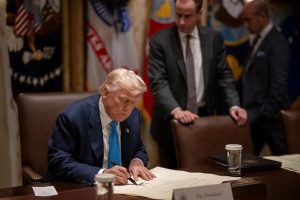President Donald Trump has signed a sweeping Executive Order expanding tariff enforcement across several trade routes, suspending duty-free treatment for low-value imports from Canada, Mexico, China, and other nations in response to a series of declared national emergencies tied to drug trafficking, trade deficits, and synthetic opioid production.
The order, issued July 30, 2025, builds upon multiple previous executive actions, invoking presidential powers under the International Emergency Economic Powers Act (IEEPA), the National Emergencies Act, and the Trade Act of 1974. The White House has framed the measures as necessary to address “unusual and extraordinary threats” to national security, public health, and the economy.
Under the new order, the duty-free de minimis exemption under 19 U.S.C. 1321(a)(2)(C)—which allows certain low-value shipments to enter the United States without tariffs—has been suspended for most imports, with exceptions only for international postal shipments and those specifically exempt under federal law. The suspension takes effect August 29, 2025, at 12:01 a.m. EDT.
The administration cited prior national emergency declarations in February and March 2025 related to illicit drug trafficking from Canada (EO 14193), Mexico (EO 14194), and China (EO 14195), as well as a separate emergency declaration concerning persistent U.S. trade deficits (EO 14257). Each of these orders had previously established tariffs or paused certain benefits, but the latest action formalizes a comprehensive policy shift to end most de minimis tariff exemptions, especially for goods suspected of facilitating evasion or illicit drug smuggling.
According to the administration, low-value shipments pose particular enforcement risks. Officials point to deceptive practices such as false invoices, misdeclared country of origin, and concealment of fentanyl or other synthetic opioids within commercial packages. The order specifically targets shipments from countries associated with transnational criminal organizations or large-scale narcotics production.
The suspension is described as independent and tailored to each respective emergency, meaning actions taken in response to Canada, Mexico, or China are not linked, but are collectively implemented through this broad directive.
Although postal shipments will temporarily remain eligible for limited duty-free treatment, the order imposes new requirements for carriers and the U.S. Customs and Border Protection (CBP). Once CBP develops and publishes a new entry system for international postal items, those shipments will also be subject to duty collections.
The order outlines two options for calculating duties on postal items. Under the Ad Valorem Method, duties are assessed based on the country of origin’s effective IEEPA tariff rate. Alternatively, the Fixed Duty Method applies a specific charge per item, ranging from $80 to $200, depending on the tariff tier assigned to the country of origin.
Carriers must choose one method per month and declare the country of origin for each shipment. This fixed-rate method is only allowed during a six-month transition period.
This executive order also directs the Department of Homeland Security to coordinate with the Departments of State, Commerce, and Treasury, as well as the U.S. International Trade Commission and the U.S. Postal Service, to implement the order. Agencies are authorized to modify existing regulations, issue guidance, and require bonds to ensure duty collection compliance.
While critics argue the suspension of duty-free treatment could raise costs for U.S. consumers and businesses relying on low-value imports, administration officials maintain that the national security interests and drug interdiction goals outweigh potential economic impacts.
The Secretary of Commerce has already submitted an assessment of the impact of prior tariffs on domestic industries, and further action is expected following the August 29 implementation deadline.



